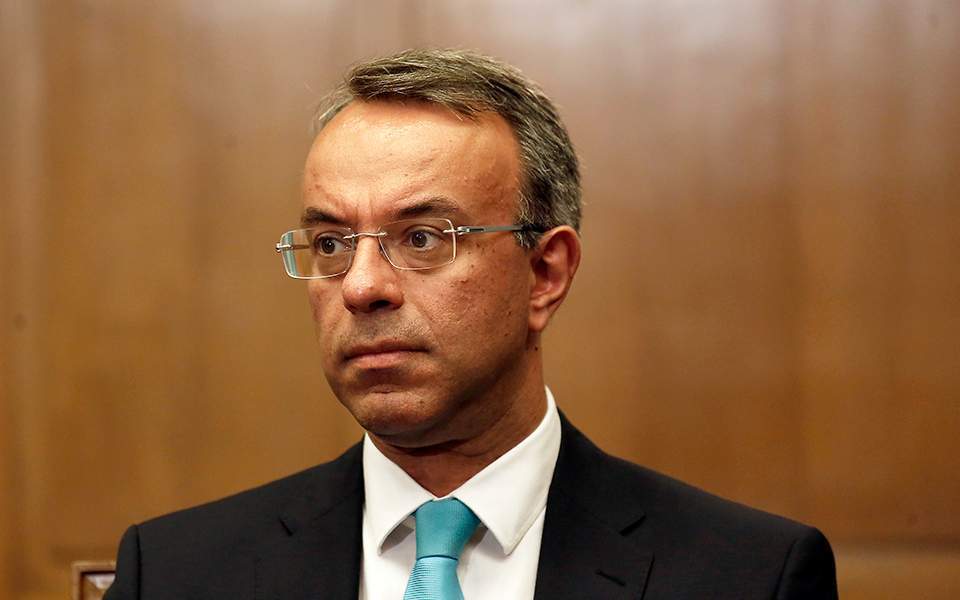
The Delphi Economic Forum’s journal features in its latest issue an article by Finance Minister of Greece Christos Staikouras outlining the conditions in the Greek economy.
Read the entire article entitled “The redirection of Greece’s growth model towards investments and exports” below:
The world and our national economies are still faced with unprecedented and continuous exogenous crises in the areas of health, geopolitics, energy, inflation and climate change – a phenomenon that has led to the widespread use of the word “permacrisis” – Collin’s Dictionary chosen word of the year for 2022.
In these turbulent times of ongoing high uncertainty and instability, reinforcing the resilience and competitiveness of our economies is a major challenge. Governments are called upon to work together and develop timely, effective and farsighted policies.
In the case of Greece, during the last three years the Government has been planning and implementing policies reflecting the aforementioned principles and resulting in important achievements, as confirmed by all “stakeholders”.
More specifically:
1st. The economic activity maintains its growth momentum and trajectory.
We achieved a V-shaped recovery in 2021 (according to ELSTAT, real GDP grew by 8.4%) and in the 2023 State Budget we project 5.6% growth in 2022. This estimate is rather conservative, as proved by the European Commission’s Autumn Forecast, according to which Greece will present a 6% growth rate – twice the European average.
While, for 2023, a year of significant slowdown of the European economy, even recession in some countries, the European Commission predicts that Greece will present the third highest growth rate in the Eurozone and three times the European average.
2nd. GDP composition positively changes.
Growth is combined with the improvement of the quality of the GDP, which gives sustainability to economic growth and constitutes a valuable springboard for further strengthening our country.
This improvement stems from the impressive strengthening of investments and exports.
This year, it is estimated that, following last – and at record levels – year, we will have a new historical performance in foreign direct investments and exports of goods and services.
In addition, the export base is significantly diversified, registering an impressive increase in the export of high-tech goods, which are now approaching the percentages of industrialized countries, such as Germany.
3rd. Labour market developments have been positive.
Unemployment continues its decline, being at the lowest level since February 2010, labour inactivity falls, employment increases by 15% more than the size of inactivity reduction, while the reduction in unemployment rate among women and youth is more pronounced than the reduction in headline unemployment rate.
4th. The banking sector has made marked progress.
The NPL ratio has been reduced from 41% of total loans at the end of 2019, to 10% in June 2022.
Deposits have increased by 48 bn. euros since June 2019.
5th. Public finances have resumed their improving trajectory.
Both the budget balance and public debt are recording a significant decline. Indeed, public debt to GDP ratio declined by 13 percentage points in 2021 and it is projected to further decrease by 27 percentage points in 2022! We also expect that the primary deficit will shrink to 1.6% of GDP this year.
Further improvement is projected for 2023.
6th. The Greek sovereign has been upgraded 11 times in the last 3 years, including 4 upgrades in 2022, following the war’s onset.
Moreover, Greece exited the Enhanced Surveillance Mechanism, as from August 20th, 2022. After more than ten years, Greece has returned to normal European surveillance.
All the above prove the effectiveness of the Government’s prudent and reform-oriented economic policy, based on 6 pillars:
1st Pillar: Providing well targeted one-off support measures, especially for the most vulnerable part of the society, taking into account that this policy does not compromise our fiscal targets and the dynamics of our public debt.
2nd Pillar: Following a credible fiscal path, mainly based on GDP expansion, with higher permanent tax revenues, enhanced by growth-friendly reduction on taxes and social security contributions.
3rd Pillar: Implementing a smart debt issuing strategy, based on low average annual gross financing needs and proactive liability management, which allows maintaining substantial cash buffers.
4th Pillar: Enhancing liquidity in the real economy, through banks’ credit expansion, the development of the Loan Facility of the Recovery and Resilience Plan, as well as the implementation of the new insolvency framework.
5th Pillar: Utilizing public property through the implementation of the Asset Development Plan, as well as of structural reforms.
Indeed, we have completed a number of important reforms to digitalize public administration, to reorganize the pension administration, to simplify the framework for investment licensing, to provide a modern corporate governance regime, to establish tax incentives in order to boost research and innovation and to increase the size of firms.
6th Pillar: Rationally utilizing the available European funds.
The National Recovery and Resilience Plan, Greece 2.0, is in full swing. To date, 440 planned projects and subprojects have been incorporated into the implementation phase, of total face value equal to 13.7 billion euros.
Evidently, despite difficulties and international volatility, Greece has turned a page.
As a result of the implemented economic policy, Greece emerged as the champion in improving the business environment for the last three years, according to a recent report by the Economist Intelligence Unit. More specifically, Greece’s ranking increased by 16 places, compared with the fourth quarter of 2019.
However, we still face lingering uncertainty, significant challenges and downside risks related to energy prices and inflation. All these require persistent reform efforts at the national level, as well as decisive solutions at the European level.
We are committed to continue working hard in order to overcome the difficulties and strengthen Greece and Europe as a whole.
Latest News

Greece Defines Continental Shelf Limits and Maritime Zones in Landmark EU Document
The Maritime Spatial Planning (MSP) framework represents a comprehensive approach to spatial planning and is crucial for the successful development of a blue and circular economy

EU Praises Greece’s RRF Progress as Revised Recovery Plan Nears Completion
Athens is preparing to submit its revised “Greece 2.0” Recovery and Resilience Plan after Easter, with a slight delay from the initial timeline but with the European Commission’s approval.

Greek €200M 10Y Bond to be Issued on April 16
The 3.875% fixed-interest-rate bond matures on March 12, 2029, and will be issued in dematerialized form. According to PDMA, the goal of the re-issuance is to meet investor demand and to enhance liquidity in the secondary bond market.

German Ambassador to Greece Talks Ukraine, Rise of Far Right & Tariffs at Delphi Economic Forum X
Commenting on the political developments in his country, the German Ambassador stressed that it was clear the rapid formation of a new government was imperative, as the expectations across Europe showed.

Athens to Return Confiscated License Plates Ahead of Easter Holiday
Cases involving court orders will also be excluded from this measure.

Servicers: How More Properties Could Enter the Greek Market
Buying or renting a home is out of reach for many in Greece. Servicers propose faster processes and incentives to boost property supply and ease the housing crisis.

Greek Easter 2025: Price Hikes on Lamb, Eggs & Sweets
According to the Greek Consumers’ Institute, hosting an Easter dinner for eight now costs approximately €361.95 — an increase of €11 compared to 2024.

FM Gerapetritis Calls for Unified EU Response to Global Crises at EU Council
"Europe is navigating through unprecedented crises — wars, humanitarian disasters, climate emergencies," he stated.

Holy Week Store Hours in Greece
Retail stores across Greece are now operating on extended holiday hours for Holy Week, following their Sunday opening on April 13. The move aims to accommodate consumers ahead of Easter, but merchants remain cautious amid sluggish market activity.

Green Getaway Ideas for Easter 2025 in Greece
Celebrate Easter 2025 in Greece the sustainable way with eco-farms, car-free islands, and family-friendly getaways rooted in nature and tradition.









































 Αριθμός Πιστοποίησης
Αριθμός Πιστοποίησης